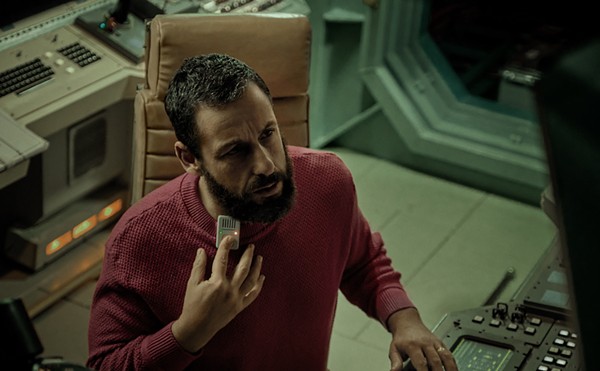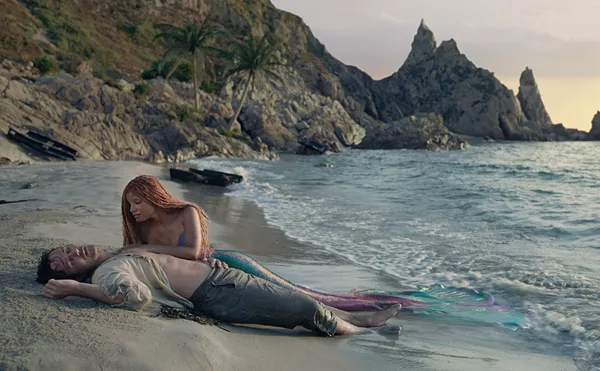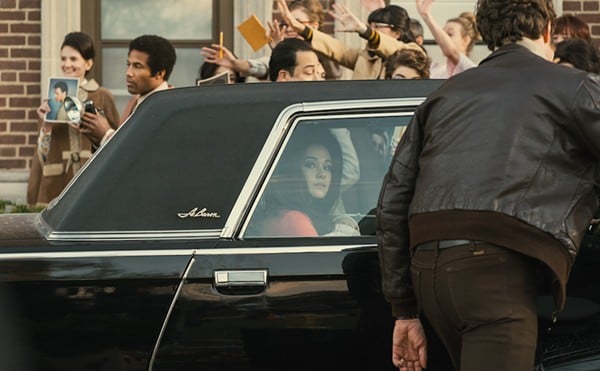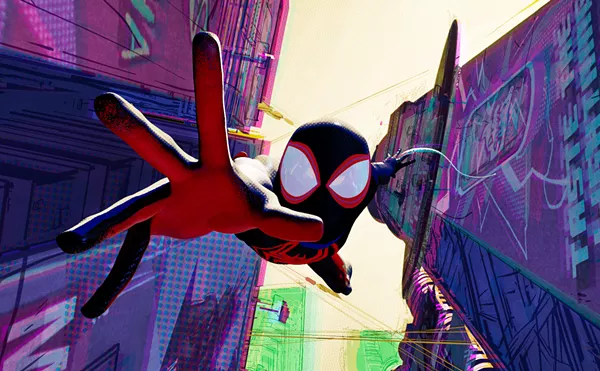ENEMY OF THE STATE
Directed by Tony Scott
Is Tony Scott an unrepentant hack or a mad genius? For years a willing cog in the Simpson/Bruckheimer machine, Scott's reputation rested on his ability to bring the superficial gloss and pace of advertising (where he and brother Ridley began their careers) to slick, witless blockbusters such as Top Gun, Days of Thunder and Beverly Hills Cop II. (His debut feature, the artsy erotic vampire film The Hunger, was a little-seen anomaly.) With 1994's Quentin Tarantino-scripted True Romance, Scott turned the tables on the Hollywood conventions of even his own movies, suggesting for the first time that a sense of humor might be lurking behind his self-conscious music-video style. Though his subsequent films (Crimson Tide and the incoherent The Fan) were slightly more orthodox in approach, Scott's cynicism has begun to slip through the cracks, revealing traces of a directorial personality that remained consistently anonymous throughout the 1980s.
Enemy of the State, Scott's latest film (and his fifth for producer Jerry Bruckheimer), is a paranoid thriller about privacy, electronic surveillance and conspiracy, with heavy emphasis on the electronic toys and tools of the trade used by the National Security Agency, a government spying operation with an almost unlimited ability to tap into phone lines, pull up bank and telephone records and, using spy satellites and video cameras, photograph and identify any person anywhere in America within seconds. (I thought there was a strong science-fiction streak in the film's depiction of the NSA's activities and hardware, but the film's publicity materials insist that they are not only realistic but actually about 15 years out of date.) Though the script paints the slacker operatives of the agency as a threat to privacy (and adds a murder plot and a ruthless bureaucrat played by Jon Voight to underline their point), Scott nonetheless treats them with a certain admiration, marveling at their professionalism, their ingenuity and even their capacity to commit mischief: They're the last word in voyeurism, and the director can't conceal his identification with their behavior.
To a large degree, Enemy of the State is a two-hour-long chase with occasional action sequences. The exceedingly likable Will Smith plays a Baltimore lawyer, Robert Clayton Dean, who comes under the long camera-eye of the law when an acquaintance slips a computer disk into his bag while he's out Christmas shopping. By the time he finds out who's after him and what they want (it's one of the curious features of the film, and part of Scott's strategy of running counter to the usual action-movie heroics, that the audience is usually about three steps ahead of the hero), his home has been burglarized; he's lost his job, his credit and most of his clothes; his picture is in the newspapers; and his wife is about to leave him because of an earlier infidelity brought back to the fore -- all courtesy of the government's information gatherers.
Scott guides Smith through the action scenes and shows the scope of the NSA in great detail -- perhaps even a little too much (it's one of the weaknesses of the paranoid thriller that once it's been established that the conspiracy can do just about anything, nothing they do comes as much as a surprise) -- but almost perversely underplays the usual action-movie menu of violence and pyrotechnics: The filmmakers even blow up a real building -- already a genre cliche -- and Scott treats it as little more than a detail in the background.
When Dean finally finds an ally in Brill (Gene Hackman), a grumpy former NSA agent, Scott finally reveals what attracted him to Enemy of the State: a chance to make a sequel/remake of Francis Coppola's 1974 drama The Conversation, the film in which Hackman played a professional surveillance expert torn by guilt over his profession. As if realizing that the action elements could fall into place without much guidance, Scott amuses himself by making Coppola's earlier character the film's voice of reason and the mouthpiece for most of its expository details. Those familiar with Coppola's film will recognize Hackman's loft headquarters, a re-creation of the famous opening sequence and even a photo from the earlier film in Hackman's NSA file. (He's not the only character from an earlier film to make an appearance: Gabriel Byrne turns up briefly driving a cab, the spitting image of Travis Bickle, and a climactic standoff between Voight, Smith and a Mafia boss turns into an operatic bloodbath in the spirit of John Woo or Tarantino.)
Scott isn't trying to make a film with the psychological depth of Coppola's; he's making a high-tech, highly commercial thriller, but he's earned the freedom to have a little fun with the conventions as long as he delivers the goods. Enemy of the State is a competent, entertaining film with plenty of twists and good performances, not only from the principals but also from Jack Black, Lisa Bonet, Regina King and most of the supporting cast. What separates it from the typically anonymous Bruckheimer action fodder -- Bad Boys or Con Air, for example -- is an authentic directorial personality slipping in. He doesn't feel superior to the material, but he can't quite take it seriously. Scott may never make a truly great film (True Romance is probably as close as he'll get), but he can't go back to the flavorless hackwork of Top Gun, either.
-- Robert Hunt
A BUG'S LIFE
Directed by John Lasseter and
Andrew Stanton
Sometimes the most sparkling, surprising entertainment comes jam-packed in a so-called children's film. Enter A Bug's Life, visually stunning computer-graphic animation with vibrant colors and extraordinary panoramas, exceptional camera angles and impeccable editing in widescreen CinemaScope. Equally impressive, director John Lasseter, with co-director Andrew Stanton, economically establishes likable characters (OK, bugs) who move his mythic story briskly. Lasseter, who guided Pixar's Toy Story to popular acclaim, again relies on rapid-fire, clever dialogue with verbal and visual puns and allusions so plentiful they fly by too quickly for us to digest them all. Imaginative, funny and with a solid message, A Bug's Life has heart and wit.
The obligatory, colony-threatening crisis is precipitated by bumbling Flik's catastrophic error. With unquestioning ritual, ants gather food at harvest time every year to appease the dreaded grasshoppers, led by the tyrannical Hopper. When Flik accidentally destroys the ants' offering, he must devise a defense. Seven Samurai-style, Flik decides he'll implore stronger and more daring species to defeat the grasshoppers and preserve his colony. But no one has ever dared leave Ant Island or conceived so heroic (or insane) a scheme.
Flik's magical journey across the dry river bed begins a fabulous adventure. After finding P.T. Flea's circus, Flik erroneously identifies a ragtag troupe of unemployed performers as warrior insects and, through reciprocal miscommunication, returns with them. Ever inventive, Flik uses his brains to escape numerous threats, including a hungry bird and the terrifying grasshoppers. Never heavy-handed, the plot highlights themes of courage and resourcefulness.
A variety of plant and animal life is rendered in luminous, iridescent colors, whereas Bugville is darker but sensational. Sweeping, complicated action scenes took animators up to 100 hours to render one frame of film, which runs 24 frames per second. The average shot required 15 hours per frame, indicating the degree of detail and care required to personify and individualize these appealing personalities: a sweet black-widow spider; a savvy, strutting walking stick; a male ladybug outraged that every insect assumes he's a she; twin, argumentative Hungarian pillbugs; a German caterpillar impatient to metamorphose; a haughty praying-mantis magician; and other wondrous insects.
A varied and effective group of actors supply the voices, from Phyllis Diller as Queen Ana to Julia Louis-Dreyfus as Princess Atta and Bonnie Hunt as Rosie the spider. Since every great myth needs a worthy protagonist and a harrowing threat, Flik and Hopper anchor the tale. Dave Foley gives Flik an appropriately nervous, excitable young voice, and Kevin Spacey brings the perfect braggadocio and arrogant bluff to the villainous Hopper.
The soundtrack takes on added importance in animated films, and 10-time Academy Award nominee Randy Newman blends an eclectic mix of great sound effects (especially for grasshoppers) and lyrical jazz, blues, western and romantic music into a harmonic whole. His concluding song, "The Time of Your Life," ought to send viewers out humming and happy. Anyone who has also had the pleasure of seeing Microcosmos will feel right at home with this bug's-eye view of the world. Every child from 5 to 95 should enjoy the lilliputian drama and the refreshing ingenuity.
-- Diane Carson
HOME FRIES
Directed by Dean Parisot
Comedy gets fresh ingredients and imaginative chefs in Home Fries. Filmmakers mix sweet zaniness with pungent darkness to create a distinctive American continued on next pageconitnued form previous pagedish. This tale of Anywhere, U.S.A., offers plenty of laughs, a clear look at family pathology and -- as comedy must -- positive change in at least one character.
Like any good comedy, Home Fries builds on the foundation of an excellent script. Writer Vince Gilligan should rejoice in the whole edifice. Barry Levinson and Lawrence Kasdan, veteran writer/directors, helped produce the film. Music by Rachel Portman adds thoughtful counterpoint. The whole production shows thought, competence and coherence. Director Dean Parisot helps a fine cast make real magic.
Drew Barrymore shows a new side of her huge talent as Sally, who works the drive-through window at the local Burger-Matic. This fast-food restaurant could inhabit almost any town of 3,000-5,000; it's on the edge of settlement, on cheap land, toward the highway. The Burger-Matic's attempts at architectural modernity distinguish it from the grim utilitarianism of other typically American buildings nearby. It's as if it were alien even to think about beauty -- or possibly sinful. Sally might embody sin for such builders. Her warmth and beauty might seem extravagant. And Sally's sin is otherwise manifest: She is hugely pregnant by a married man who lied to her about his marital status.
Home Fries opens with the father, Henry Lever (Chris Ellis), pleading with Sally at the drive-through window. No, she won't see him. We blame him less, perhaps, when we meet the wife (Catherine O'Hara), a truly frightening person. She has tried her best to warp her grown sons from a previous marriage. With Angus (Jake Busey), she has completely succeeded; the film's comedic drama partly hinges on whether the other son, Dorian (Luke Wilson), can break free.
Other actors include some fabulous Cobra helicopters and a marvelous set at a tobacco warehouse. Burger-Matic's manager and workers make a convincing "family" ensemble. The great Shelley Duvall plays Sally's mother, who cheerfully keeps her family together in a dirt-poor shack, a contrast to the middle-class Lever house. Perhaps it's fair to say that each household has its craziness, but even Sally's alcoholic father doesn't match Mrs. Lever. Her chilling plots for revenge drive much of Home Fries' plot.
All the acting shines, but O'Hara courageously plumbs her character's darkness. Wilson portrays the repressed, conflicted Dorian, showing his struggles subtly with face and body. Most of all, Barrymore shines like a sunbeam whose lush loveliness radiates heat and light in the semidarkness.
Occasionally the film goes over its edge, notably in a wild scene in Burger-Matic. This satisfying satire of fast-food culture has one gun too many and grabs at laughs with uncharacteristic crudeness. The climactic scene may seem over the top to some; on the other hand, the film has carefully laid the psychological groundwork for this intensity.
So bring your appetite and hang on to your hat. Home Fries serves a zesty and nourishing all-American meal.
-- Susan Waugh
THE INHERITORS
Written and directed by Stefan Ruzowitzky
In our role as guides -- orienting viewers to new filmic territory by citing familiar reference points -- critics will inevitably describe the wondrous The Inheritors as an Austrian Western, and that's a valid comparison for a tragicomedy whose primary conflict is a territorial dispute, a blood feud over land that evokes American-frontier tussles between cattle barons and homesteading farmers. The key difference here is that The Inheritors is populated more by Marxmen than shootists: The movie isn't just a struggle between big guys and little guys, both of whom are essentially entrepreneurs, but between the moneyed elite and a proletarian collective. It's a critique of capitalism, if not quite a communist manifesto, and the conclusions it draws are bleak.
Before The Inheritors reaches its ominously clouded end, however, it provides plenty of sunny entertainment. The film begins with a death -- and the subdued Old Master lighting of the film, by cinematographer Peter Von Haller, clearly portends an eventual movement into darkness -- but the movie treats the murder of tyrannical landowner Hillinger and its surprising consequences as playful, almost farcical comedy. Done in by a mysterious old woman (Elisabeth Orth), sardonic Hillinger plays one last meanspirited joke on his greedy rival farmers -- who eagerly anticipate buying his land -- by willing his estate to his much-abused peasant workers. This seemingly altruistic gesture is anything but: Not only does Hillinger gig his fellow gentry, but he believes his farmhands will squabble among themselves, losing both their class solidarity and eventually their inheritance.
At first, Hillinger's dire predictions appear all too accurate, with the workers splitting into rival factions, but once the co-opted foreman (Tilo Pruckner) and his followers exit the group, the seven remaining "inheritors" -- derisively called the one-seventh farmers -- work together to achieve unexpected success. The Inheritors is at its happiest during this period of blissful communal effort. Lukas (the delightful Simon Schwarz), a likably goofy orphan who's spent his entire life on the farm, makes a naive attempt to assert his patriarchal authority, but he's slapped down by his strong-willed lover, Emmy (Sophie Rois), who insists on equal rights among all, men and women, and soon the farm hums as an efficient cooperative. This affront to the natural top-down order enrages the neighboring farmers, led by the threatening Danninger (Ulrich Wildgruber), and the story inexorably moves toward its grim end, with violent clashes and dramatic revelations, death and exile.
Writer/director Stefan Ruzowitzky negotiates this U-turn into tragedy with skilled dexterity, smoothly shifting moods, provoking thought (and earned emotion) as deftly as he elicits laughter. And although it carries clear social and political messages, The Inheritors never seems freighted with a burdensome anti-capitalist agenda: It remains a story, not a tract, and it's peopled with complex, winningly flawed characters, not simplistic representatives of the warring classes (Wildgruber even lends Danninger an evil grandeur). The Inheritors proves one of the richest offerings of a somewhat impoverished year.
Opens Nov. 27 at the Plaza Frontenac.
-- Cliff Froehlich





